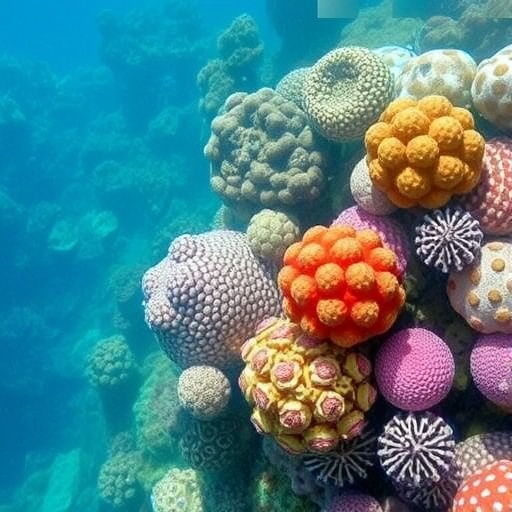In the face of climate change and extreme weather, coral reefs around the world are experiencing unprecedented stress. The devastating impact of cyclones on these ecosystems has been a significant focus of recent scientific research. A new study led by Ford et al. sheds light on the resilience and recovery of locally managed reefs following the onslaught of extreme waves from a Category 5 cyclone. This research, published in the esteemed journal Coral Reefs, provides critical insights into the effects of extreme weather and local management practices on the resilience of coral ecosystems.
The study delves into the immediate and long-term impacts that such intense weather events have on coral reefs. Cyclones are known to bring not only ferocious winds but also massive waves that can physically damage the corals, disrupt marine habitats, and lead to significant biodiversity loss. Ford and colleagues meticulously analyzed the response of reefs situated in areas with various management strategies, comparing those that are well-managed against those that are left vulnerable.
Researchers conducted extensive field surveys post-cyclone, closely monitoring changes in coral cover and the overall health of reef systems. These assessments were vital in understanding how various layers of management can either buffer these natural disasters or leave ecosystems much more susceptible to their effects. The results were eye-opening, presenting a stark contrast in recovery rates between managed and unmanaged reefs.
The capacity for recovery in coral reefs is influenced by multiple factors, including the genetic diversity of coral species present, the health of associated marine life, and the intensity of the cyclone’s impact. The study found that reefs with robust management practices in place, including measures such as protection from overfishing and habitat restoration, exhibited a remarkable resilience. Conversely, unprotected reefs displayed significant degradation, struggling to recover even months after the cyclone passed.
One particularly concerning finding from the research highlights the role of local communities in managing these ecosystems. Engaged local stewardship has repeatedly shown positive outcomes for coral health, allowing reefs to withstand extreme events better than those without local oversight. The paper emphasizes the importance of involving indigenous knowledge and community participation in conservation efforts. Such strategies not only enhance resilience but also help in building a stronger bond between people and the marine environment they depend on.
The long-term implications of cyclone damage on coral reefs extend beyond immediate physical destruction. The loss of coral cover not only affects the intricate marine life dependent on these habitats but can also alter the overall function of coastal ecosystems. Reefs provide vital services, including coastal protection against erosion, fisheries support, and tourism opportunities. Thus, their degradation can have profound impacts on local economies and livelihoods, necessitating urgent management strategies to temper the effects of climate change and extreme weather.
Ford et al.’s findings drive home the critical nature of recovery periods following such extreme events. The researchers noted that while some reefs began to show signs of gradual recovery, others exhibited alarming rates of mortality and stasis. This disparity raises significant questions about the adequacy of current conservation techniques in the face of increasingly severe weather patterns.
Moreover, the research indicates that proactive approaches in reef management can serve as essential buffers against the detrimental effects of cyclones. Programs focusing on restoration, habitat protection, and sustainable use of resources can significantly bolster the resilience of coral ecosystems. Building and sustaining these collaborative management strategies is paramount for long-term success and conservation efforts.
As researchers continue to uncover the delicate dynamics between coral reefs and extreme weather systems, the urgency to act grows. Findings from Ford et al. remind us that every cyclone serves as a poignant reminder of the challenges facing these underwater ecosystems. It reinforces the necessity for collaborative and innovative management practices that safeguard these critical marine habitats.
In conclusion, as climate change continues to intensify weather patterns globally, the need for strategies that prioritize the protection and recovery of coral reefs becomes imperative. The insights provided through this research illuminate pathways for enhanced resilience against future cyclonic events and serve as a clarion call for immediate action. Protecting coral reefs is not merely an environmental issue; it is a pressing social and economic imperative that affects millions of lives worldwide.
The implications of this study transcend geographical boundaries, offering a model for reef management that could be implemented in tumultuous regions worldwide. As communities band together to foster resilience, the hope remains that the beauty and diversity of coral reefs can endure the challenges of an ever-changing climate.
As the aquatic world braces for more tumultuous times, studies like this underscore the critical intersection of human stewardship and ecological science. The future health of our oceans may well depend on the lessons learned from these fragile ecosystems, underscoring the profound interconnectedness of all living systems on Earth.
In supporting local management and scientific inquiry, we prepare not only to mitigate the effects of extreme weather but to ensure that future generations inherit a thriving ocean, rich with life and resilient against the forces of nature.
Subject of Research: Resilience and recovery of coral reefs after extreme weather events
Article Title: Comparing impacts and recovery of locally managed reefs after exposure to extreme waves from a category 5 cyclone
Article References:
Ford, A.K., Hamilton, M., Nand, Y. et al. Comparing impacts and recovery of locally managed reefs after exposure to extreme waves from a category 5 cyclone. Coral Reefs (2025). https://doi.org/10.1007/s00338-025-02717-7
Image Credits: AI Generated
DOI: 10.1007/s00338-025-02717-7
Keywords: Coral Reefs, Extreme Weather, Cyclone, Management, Resilience, Marine Ecosystems




